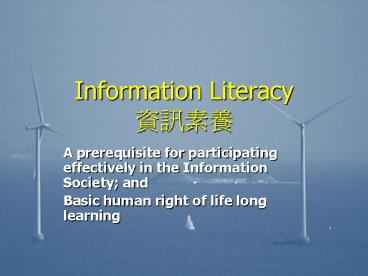Information Literacy ???? - PowerPoint PPT Presentation
Title:
Information Literacy ????
Description:
A prerequisite for participating effectively in the ... a definition ... Plagiarism in assignment. Intellectual property right. Ethics on ... – PowerPoint PPT presentation
Number of Views:17
Avg rating:3.0/5.0
Title: Information Literacy ????
1
Information Literacy????
- A prerequisite for participating effectively in
the Information Society and - Basic human right of life long learning
2
Information Explosion
- With millions of Web sites built, books, DVD and
CD published every year, the amount of
information increases rapidly in the forms of
texts, graphics, images , sounds and videos. - On the Web, anyone can publish anything making it
necessary that users browsing the Webs for
information have the ability to discriminate
between high quality, reliable information and
misleading, inaccurate information and everything
in between. - Searching and locating needed information become
more difficult this is termed as information
overload
3
Information Literacy a definition
- Faced with such an information explosion,
students lack sufficient and efficient skills to
use information and technology in learning - Educators propose this new learning goal - IL
- The knowledge, skills, ethics and values
necessary for effective and critical use of
information and technology
4
A Movement
- THE PRAGUE DECLARATION (2003)
- "TOWARDS AN INFORMATION LITERATE SOCIETY"
- World summit on the information society (Geneva,
2003) Draft Declaration of Principles - Building the Information Society a global
challenge in the new Millennium
5
- We, the representatives of the peoples of the
world, assembled in Geneva from 10-12 December
2003 for the first phase of the World Summit on
the Information Society, declare our common
desire and commitment to build a people-centred,
inclusive and development-oriented Information
Society, where everyone can create, access,
utilize and share information and knowledge,
enabling individuals, communities and peoples to
achieve their full potential in promoting their
sustainable development and improving their
quality of life, premised on the purposes and
principles of the Charter of the United Nations
and respecting fully and upholding the Universal
Declaration of Human Rights.
6
?????????? 2003? ??? 2005? ???
- ??,???????,?2003?12?10??12???????,????????????????
??,??????????????????????????????????????????????,
????????????????????,??????????????????????,??????
????????????????????????????????,??????????????
?
7
The Information Literacy of a child
- A ten-year old girl on holiday saved over 100
lives in Phuket, Thailand, when the tsunami hit
in December 2004 because she was information
literate. Details of this story were shared
during a High Level Colloquium on Information
Literacy and Lifelong Learning, in Alexandria,
Egypt, on 6-9 November 2005. - Tilly Smith of Oxshott, England, having
researched tsunamis two weeks prior to her
holiday in geography class, recognized the early
warning signs of an imminent tsunami, and took
action. Because of her ability to use and apply
the knowledge she had learned, the beach was
cleared and no lives were lost.
8
There is not a unified term to denote information
literacy !
9
Goal 1 Empowering Learners with IT
Students will acquire the necessary skills,
knowledge and attitudes for lifelong learning and
creative problem solving in the information age.
They will use IT as an information retrieval,
knowledge enquiry, communication, collaboration,
analytical and personal development tool.
10
Framework of Information Literacy in the new IT
in Education, Hong Kong SAR
- Reference
- http//www.emb.gov.hk/index.aspx?langno1nodeid2
679
11
Framework of the Information Literacy Study
12
The Scope of Information Literacy
- My understanding within the IT background
13
0. The Need for Information
- Awareness of the needs
- Location/identification of information needs
- Setting up information problems
- Development of action plan to solve information
problems independently or collaboratively
14
I. Searching Information
- Primary Sources
- Field trips, interviews, asking experts, surveys,
experiments - Secondary and Tertiary Sources
- An electronic encyclopedia
- An electronic dictionary
- Newsgroup on the Web
- Search engines on the Web
- Search methods keywords or directories
- Online library catalog
- Development of information search strategies
15
II. Organizing Information
- Recording information
- A variety of organizational and recording methods
and styles - Print, non-print materials or electronic
information - Graphic organizer
- Database
- Bibliography
16
III. Processing Information
- Word processing on report writing
- Not purely text-based, visual information such as
tables and graphics should be integrated - Number processing
- Charts, tables, statistical methods
- Presentation of information
- PowerPoint/Flash including animation
- Listening and questioning skills
- Delivery/publication of information
- Web pages, posters, booklets and other
information promotion materials
17
IV. Evaluating Information
- Criteria authority, relevance, objectivity,
currency, coverage, and accuracy - Primary sources and secondary sources
- Judgment of adequate information to solve the
information problems, awareness of missing
information - Judgment of evaluation by peers
18
V. Effective Use of Information
- Originality and synthesis (no copy and paste)
- Accuracy and comprehensiveness without bias
- Creativity
- Crediting information sources correctly
- Use of bibliographic standards for citing sources
19
VI. Information Activities
- Integrated and contextualised activities
- Project learning in schools
- Decision making and information in personal life
- Democracy and information in the society
- Plagiarism in assignment
- Intellectual property right
- Ethics on using information
- Consequence of misuse of information
- Leaning community































